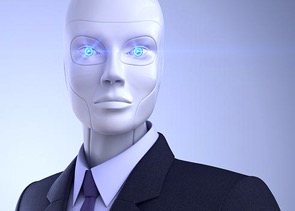Call It Robot, Call It CEO: Will AI Replace the C-Suite?

A hot topic these years is whether technology – mainly Artificial Intelligence (AI) – will decrease humans’ jobs, both blue collars roles – which are the most repetitive and mechanised – and managerial positions as well. Some people agree with that while others don’t.
Everything starts from the definition of AI. It depends on who you ask. Minsky and McCarthy, AI’s fathers, define it as any task accomplished by a program or a machine that, if humans had fulfilled the same activity, they would have had to employ intelligence. [1]
It seems clear that AI has linkages with humans but it’s not all that human-like. Despite this, two divergent tendencies in thinking about AI arise: either it is cool, magical and spooky or it is tedious, statistics-based and useful.
The first side boasts two renowned technology gurus: Elon Musk – among other things, the co-founder of Tesla – and Jack Ma – Alibaba’s co-founder. In fact, Ma said that “in 30 years, a robot will likely be on the cover of Time Magazine as the best CEO” [2] and Musk furthered that “AI is our biggest existential threat”. [3] The two innovators seem to be in agreement with comparing AI’s key features with human ones, and both reckon that the former will overwhelm the later. In this perspective, AI looks like a real threat, primarily for workers and then for all people.
On the other hand, there is Craig Martell, Head of Science and Engineering at LinkedIn, who during his last speech at Stanford stressed how AI has nothing to do with human intelligence and that there are no reasons to be afraid of it. He explained clearly what AI is and how it works: you don’t have to imagine sci-fi magical stuff but merely statistics (mainly logistic regression), since “AI is just doing statistics in a super-high dimensional space, gather past data, compare it over, over, over and over again, and make predictions under uncertainty”. [4]
Despite the different opinions on AI, most experts agree on the fact that somehow it will deeply affect the business world. And data supports this intensely. According to a report by Deloitte conducted in the UK, there is a 77% probability that 1.3 million “repetitive and predictable” roles will be automated by 2030, a 23% odds that automation will affect “high degree of personal interaction” jobs, i.e. teachers, police officers, etc., and a 14% chance that it will impact “cognitive roles that require strategic thinking and complex reasoning”, namely C-Level positions. [5]
This last percentage sounds unusual since a manager – perhaps, even the CEO – being substituted by a device is pretty weird.
This topic raises various thoughts as well, ranging from the astonishing outcomes of the iCEO experiment – i.e. a Robot-Chief Executive Officer that really manages a company – [6] to the skeptical opinions that machines might be smarter than previously thought but that humans will always be more intelligent.
A Robot-CEO could seem sci-fi, but it would carry substantial benefits for a company. For instance, it could foster more sound and objective decisions, since it would be able to achieve a higher level of certainty in decision-making; moreover, it could work 24/7 the whole year, since it doesn’t need to rest nor go on holiday. [7] Besides, a robot could halve the time it takes to accomplish hard tasks, and it doesn’t need any income, benefits, and so forth. Therefore, costs will dramatically plummet. On the other hand, the pitfalls of having a robot as CEO are basically all related to the lack of human aspects: emotional intelligence, empathy, values, networking, creativity, the so-called “soft skills”, which gradually are outweighing the hard ones in business schools as well as in the work environment.
Nowadays, it’s quite tough to foresee if one day in the boardroom there will be robots instead of humans. The most feasible scenario concerns a hybrid situation, i.e. a tighter and continuous interaction among managers and AI devices to make better decisions.
After all, great companies gather inspiring people rather than efficient machines, since customers – who represent companies’ main concern – are persons with a head full of needs to fulfil and not robots with a data set to sample. AI might never be able to change this.
Sources:
[1] https://www.zdnet.com/article/what-is-ai-everything-you-need-to-know-about-artificial-intelligence/
[2] https://www.cnbc.com/2017/04/24/jack-ma-robots-ai-internet-decades-of-pain.html
[4] Craig Martell, Head of Science and Engineering at LinkedIn, 7/13/18 Lecture at Stanford for Leading Trends in IT (MS&E 238) Course
[6] https://hbr.org/2015/04/heres-how-managers-can-be-replaced-by-software
[7] https://www.weforum.org/agenda/2017/01/could-the-ceo-be-replaced-by-a-robot/


